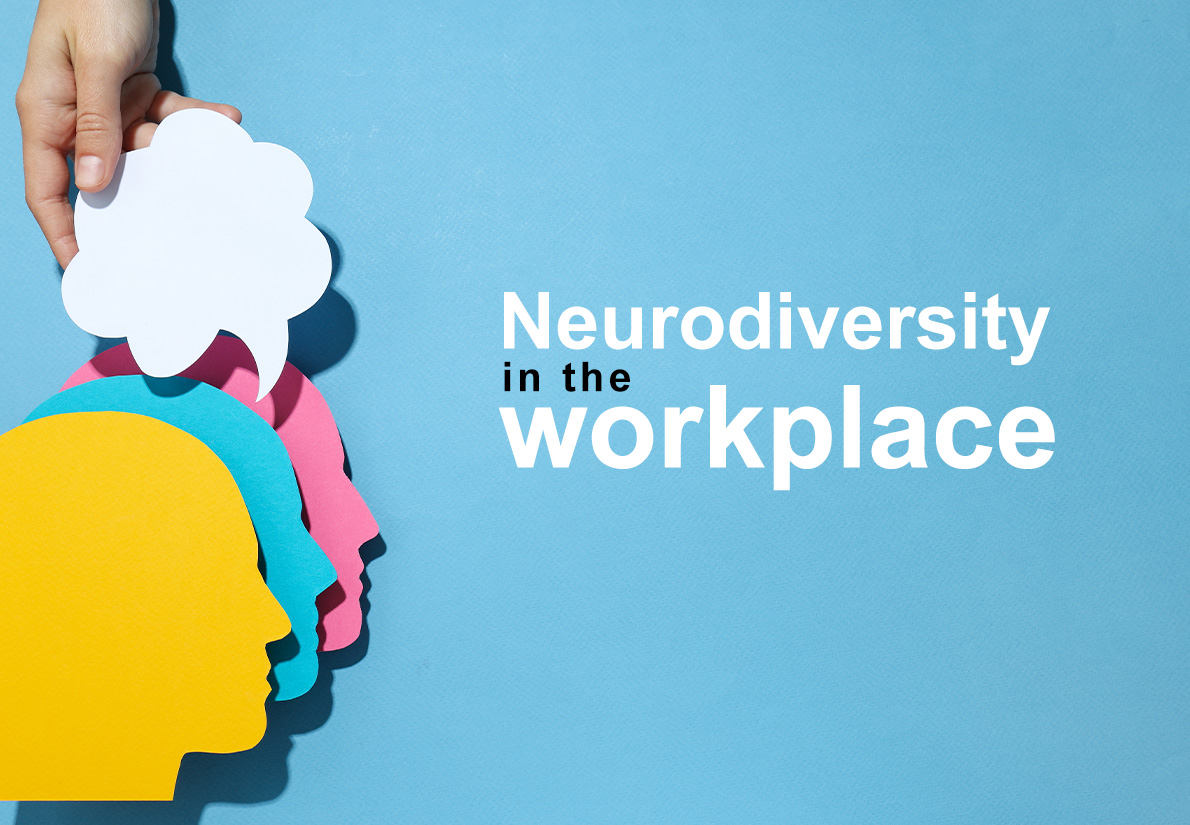The value of difference – Embracing the benefits of neurodiversity in the workplace

Attitudes to what constitute the workplace and who the workforce within it actually are, have probably seen more changes in the last few years than in the preceding decades. One of these changes is the re-evaluation of the role neurodivergent workers can play in the workplace.
What do we mean by embracing neurodiversity in the workplace?
We have seen several major shifts in attitudes to the workforce in recent times. There has been the move to more flexible working; recognition of the importance of inclusive and welcoming environments; the increasing value of employer brand and, of course, the still growing understanding that diversity is a major factor in a creative, successful workplace, to name but a few. Among all these attitude changes there is also a growing movement that is challenging the traditional notions of ‘normal’ and a building realisation that individuals with a neurodivergent outlook have unique strengths and abilities to bring to the workforce.
Neurodiversity describes the idea that all people experience and interact with the world around them in different ways. Neurodiversity is often used in the context of Autistic Spectrum Disorder (ASD); however, it isn’t a synonym for ASD. When we say neurodiverse, we are actually referring to the diversity of all people, including ASD and other neurological and developmental differences in learning, perception and behaviour, such as ADHD, learning disabilities and difficulties, like dyslexia.
In a nutshell, when we talk about embracing these conditions in the workplace, we are looking to recognise the contribution that can be made by neurodivergent workers, what their needs may be and what steps, if any, you need to take to create an inclusive workplace that accepts, nurtures, and develops their talents.
Why encourage neurodiversity in the workplace
There are many very compelling reasons to encourage a diverse workforce into the workplace. Neurodiversity embraces the idea that differences are not deficits. There are significant benefits to employing a team of individuals with a range of strengths and skills.
For example, people with ASD can possess cognitive strengths in areas such as pattern recognition, attention to detail and problem-solving, creativity, and analytical thinking. Many neurodivergent individuals possess remarkable skills when it comes to pattern recognition and difference from that pattern, many are meticulous in their attention to accuracy and precision work. Technical and Analytical functions are therefore a natural home for an individual with these traits.
Some neurodivergent individuals commit to resolving a problem with exceptional application to the task. Others see the world in a way that will bring unique insights and approaches that are unavailable to neurotypical minds. They will often see patterns and connections that may go unnoticed by others. All of these are very valuable assets.
It only takes a moment’s thought to see how useful these traits can be in most workplaces.
How to create a welcoming workplace for neurodiverse employees.
Creating a work environment that welcomes as many individuals as possible starts with understanding the needs of those individuals. This approach is as valid with neurodivergent employees as it is with any other worker.
Here are some strategies to consider:
- Education and Awareness: Educate the existing workforce about neurodiversity. Perhaps begin by dispelling myths and stereotypes to foster a clearer understanding. Try to encourage empathy and understanding by disseminating clear information about the new employees and promoting the value of the new workers.
- Sensory Considerations: some neurodivergent people experience sensory processing differences. Providing quiet spaces, adjustable lighting, and noise reduction measures will help you support neurodivergent individuals who may be sensitive to sensory stimuli.
- Supportive Communication: Encourage active listening, empathy, and understanding across all levels of the organisation. It’s important for co-workers, and particularly managers who issue instructions, to understand that their language may need some adjustment. Neurodivergent individuals sometimes struggle to interpret instructions unless they are specific and may not make the same assumptions as neurotypical workers.
- Mentoring and Support Networks: Establish mentoring programs and support networks that connect neurodivergent employees with allies and advocates. These networks can then be used to provide guidance, support, and opportunities for personal and professional growth.
- Targeted Training and development: Some established training methods and approaches may not be suitable for neurodiverse workers, and they may require adaptations, such as extra time to complete training tasks or adapted methods of delivery.
Most of all, learn. It is important to understand the individual needs of the neurodivergent worker so you can release their talents and productivity. It is important to include people in decisions about how they would like to be supported in the workplace, ensuring we build a supportive environment with, rather than for employees.
Missing out on a huge opportunity
In the end, welcoming neurodivergent workers into the workplace may require a few small changes but the most important, and possibly difficult one, will be to redefine how we see difference. We need to challenge the notion that neurological differences should be considered disorders or disadvantages. These differences are not burdens or disabilities to be compensated for, they represent natural variations of the human brain and have their own strengths and perspectives.
By embracing neurodiversity, businesses can open doors to a vast pool of untapped talent and skills. In an employment market where there is a constant fight for talent, and a changing workplace where diversity is proving to be a major advantage, it seems counterproductive to not welcome this skilled candidate pool.
As always, we are here to help when it comes to employing neurodivergent workers or any other human resource areas, so call us and let’s talk.














